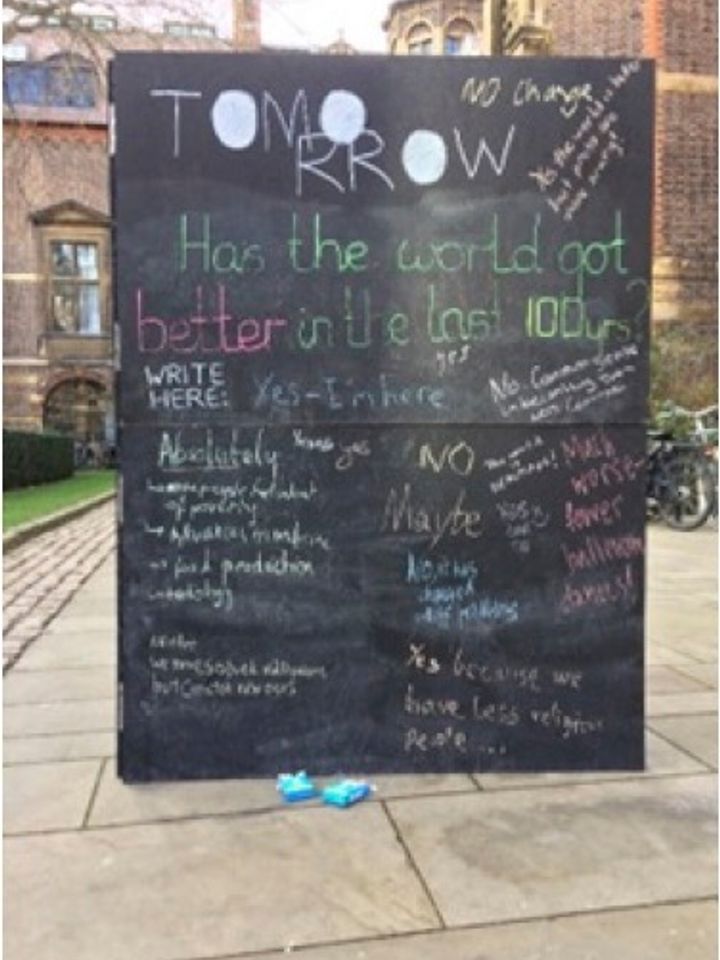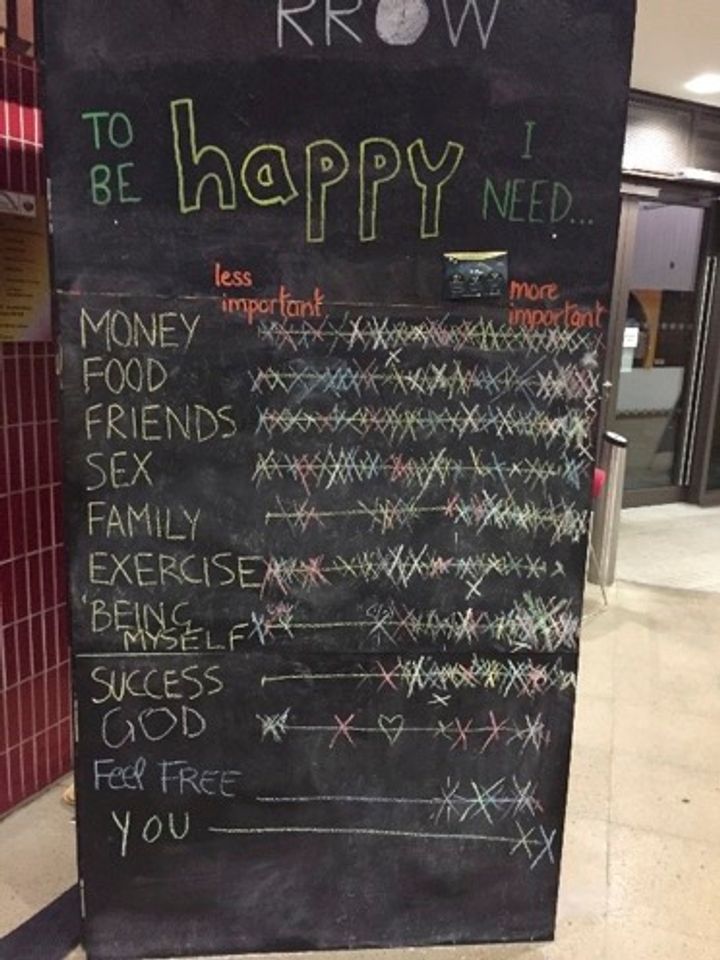Principles
- Gracious posture: In all we do we want to communicate love and humility: a posture of listening and seeking the person’s good, rather than wanting to thrust our questions and answers on them. Always seek to give people clear ways out of conversations and ask several questions before you share.
- Cultural engagement: Much of European culture is way further back in terms of their understanding of Christianity than we might think. For this reason, engagement questions often work best when they start with the existential and people’s felt reality (e.g. human desires or the world that they see around them).
- Overtly Christian: We do want to make it clear from the outset that we are Christians so that people don’t feel ambushed. The best way of doing this is visually (CU banners, the CU name written on engagement boards, etc.) and verbally (‘Hi, we’re the Christian Union and we’re wanting to create conversation around…’).
Engagement Activities:
- Jesus-centred: Where possible, we want to try to bring conversation around to Jesus. Encourage the team regularly in this.
- Prayerful: Encourage the team to pray for conversations they can see going on, and to pray arrow prayers as they engage in conversations themselves.
- Body language: People are far more likely to engage if you approach with a smile, eye contact, relaxed posture, conversational tone, and don’t lead by thrusting a flyer in their direction!
- Next Steps: Have some relevant literature on a table if people seem properly engaged in conversation and you want to give them an easy next step. Have flyers to hand to invite people to events. If it seems right, exchange details and meet for coffee to continue conversations.
- Activities: Below are a number of activity ideas, ordered by theme.
Examples
Here are a number of examples of first-contact ideas that connect to different themes:
Truth
Example 1
‘Truth is…’ axes
People can plot their view of truth on the graph
Axis 1: out of reach — within our grasp
Axis 2: essential for society — irrelevant in a subjective world
Possible conversation starters
- What makes you put yourself there?
- What do you study — does this kind of question come up at all?
- Do you think humans will ever fully understand the world or will some things always stay out of our reach?
- Do you think there's one truth that could unlock them all?
- Do you feel like truth has lost its importance for today's world? Is that a good thing?
- Can you have ethics without objective truth? What are your ethics based on?
- What would it mean for truth to be a person? I know that sounds a bit crazy!
- In the Bible Jesus says that 'the truth will set us free' — what's your opinion on that?
Example 2
‘What kind of God do you (not) believe in?’ scale
People can plot their view of God on a scale from:judgmental & demanding — distant & impersonal — inclusive & welcoming
Possible conversation starters
- Is that based on an experience of yours? (don't worry if you'd rather not talk about it)
- If God existed, how do you think getting to know him would be similar/different to getting to know your mate?
- Would you want God to welcome everyone?
Example 3
'Is the Christian faith inherently arrogant?’
The statement is written on the board — people can add their opinions and respond to what other people have written
Possible conversation starters
- That’s really interesting — is that based on an experience of yours? (don't worry if you'd rather not talk about it)
- What about Christianity do you find arrogant?
Identity
Example 1
‘Where are you most likely to find yourself?’ map
People can put stickers on a world map to show where they think they'd be most likely to ‘find themselves’
Possible conversation starters
- Interesting! Have you ever been there?
- What about it do you reckon would make you find yourself?
- Why do you think we go to find ourselves in beautiful places, rather than the mundane?
- What about yourself would you most like to find?
- Do you think there's a 'real you' to find? If so what or who determines who that person is?
Example 2
Identity — Felt or Given?
On long mirror, draw the scale:
Felt -------Identity? --------Given
People write their initials on a sliding scale.
Possible conversation starters
- Why do you think that?
- Is it possible to live with just a ‘felt’ identity?
- What kind of people give you your sense of identity? How does that feel? Do you think its ever right to fear or resent their influence?
- How do these options deal with the parts of our identity that we don’t like?
Example 3
Write a story
Rip out pages from an old book, get people to write a single word on a page, and to stick it to the board. An unfolding story will emerge as more people add words.
We’re doing this because we’re thinking about our own stories as people.
Possible conversation starters
- What’s your story?
- Do we write our own stories or are they a collaboration?
- Do you have a sense of your full story? Or do you feel like you can just see a page at a time?
Example 4
‘What stops you being who you want to be?’ scale
People can plot their view of truth on the graph
Axis 1: stuff outside me — stuff inside me
Axis 2: I want to change — I’m already who I want to be
Possible conversation starters
- Why do you reckon that is?
- What has made you the person you want to be? / What do you think is holding you back from being who you want to be?
- How hopeful are you of getting past those things?
Example 5

‘What are you most the product of?’ poll
A list of different options that people can vote for by adding a tally, including: my choices, my experiences, parents, ethnicity, gender, education.
People can add their own options to the list.
Possible conversation starters
- What about that thing has been important for you? What about you has it shaped?
- If we're just the product of our experiences and upbringing, do you think we’re anything more than a coincidence?
- Do you think it’s possible to change? Would you want to?
Example 6
What are you known for?
Statement in the middle of a chalkboard where people write or draw what they’re known for.
Possible conversation starters
- Do you enjoy that label? Why/why not?
- Has that always been the case? Do you think that might change?
- Do you think its possible to get a stable sense of ‘who we are’?
Purpose/progress/hope
Example 1
‘Progress is...’ axes
People can plot their view of truth on the graph
Axis 1: out of reach — within our grasp
Axis 2: down to human skill — up to chance
Possible conversation starters
- Interesting! Why do you think that?
- What kind of progress do you have in mind when you answer this?
- What do you think is holding us back?
Example 2
‘What's your favourite happy ever after story?’
People can add their favourite stories.
Possible conversation starters
- Affirm what you can / ask about stories you haven’t heard of
- What’s your favourite bit of the story?
- What about it do you reckon makes it a happy ending? How realistic a story do you think it is?
- How do you think you’d feel if it was your story?
Example 3

‘Has the world got better in the last 100 years?’
Space to share thoughts and respond to what others have said.
Possible conversation starters
- What makes you think that?
- Does this make you hopeful for the future? / Does this make you pessimistic about the next century?
- What do you reckon is still holding us back?
- What kind of progress do we need? Is moral progress as important as technological and scientific progress?
Example 4
‘What does the world need most?’ poll
A list of different options that people can vote for by adding a tally, including: education, tolerance, peace, medicine, hope, honesty, justice.
People can add their own options to the list.
Possible conversation starters
- Affirm what you can! The world has loads of needs
- Have you noticed that more recently or have you thought it for a while?
- Why have you gone for that one in particular?
- Is that something you're personally involved in?
- What makes you most hopeful that things will get better?
- What do you reckon we need to do to get there? What’s holding us back?
- Do you think this is the responsibility of everyone? Or is this just a personal calling for you?
- Do you think people have an ultimate purpose? Where does this purpose come from?
Example 5
‘Your Story…’ axes
People can plot their view of their story on the graph.
Axis one: Hopeless — Hopeful
Axis two: Written by you — Written by others
Possible conversation starters
- Why do you say that?
- What things make you hopeful/hopeless?
- How vital are you in making your story one of hope?
- What obstacles to hope are there in your life?
- How do you overcome these?
- If there was a God, do you think he’d make your life more hopeful? Do you think he’d want to change how your story is written?
Personal achievement/contentment
Example 1

‘To be successful/happy I need...’ scale
Several sliding scales horizontally along the board for people to plot how important each category of success is, including: academic work, romance/sex, friendships, 'being yourself', making money, following your calling
[This can also work as a poll where people vote by adding a tally/their own options]
Possible conversation starters
- Has that always been important to you?
- Do you think X isn’t so important then?
- What do you reckon makes success/happiness in that valuable?How confident do you think we can be that getting X will make us successful/happy?
- Do you think basing success/happiness on any of these things has the potential to be harmful? Why/why not?
Example 2
Would you rather win something as a prize or be given it as a gift?
Space to share thoughts and respond to what others have said.
Possible conversation starters
- Have you got any wins or gifts in mind there?
- What do you think we love about winning/getting gifts? Why?
- What difference do you think it makes to the way we see ourselves and each other?
- Do you think [our uni] needs more winning or more giving/receiving?
- I was asked this question recently ‘What do you have that you did not receive?’ — what do you reckon you’d say to that? Could it be that even our wins are given to us?
Example 3

Home is…
Space for people to write or draw what ‘home’ means to them. Invite them to discuss others people’s answers.
Possible conversation starters
- Why do you say that?
- Is home more about people or place?
- What things stop us from feeling ‘at home’?
- Is ever possible to feel truly ‘at home’ in the world?
- What does our sense of ‘home’ tell us about what we value most as people?
Example 4
Mirror of Erised
The mirror of Erised in Harry Potter shows people their deepest desires. Use a large mirror and get people write or draw what this mirror would reveal for them. Invite them to discuss other people’s answers.
Possible conversation starters
- Affirm where possible.
- Has this changed since you’ve come to university?
- How hopeful are you that these desires will be met one day?
- What do these desires tell us about who we are as people?
Meaning
Example 1
Are there questions science can’t answer?
Either a Yes/No tally, or encourage people to write the questions they think science can’t answer.
Possible conversation starters
- What questions can’t science answer? Why?
- Do you think there is more to life than the material, the things we can see?
- Do you think we live as if its only the physical that matters? Why? Why not?
- Can science answer the question of God?
Example 2
Is there meaning in my pain?
Yes/No tally.
Possible conversation starters
- What makes you say that?
- If you don’t mind sharing, what meaning have you found in your pain?
- Do you live as if there is not meaning in your pain?
- What do you think God thinks about pain?
Example 3

What does it mean to be human?
Encourage people to write/draw their answers.
Possible conversation starters
- Why do you say that?
- Do you think we’re different to other forms of life?
- Where do you think our sense of human rights comes from?
- Are humans more defined by their talents or their flaws? What do you feel more defined by?
Example 4
‘Reality is…’ axes
People plot their view of reality on the graph:
Axis one: Meaningful — Meaningless
Axis two: Purely physical — More than physical
Possible conversation starters
- Why did you put yourself there?
- Relating to their answer, ask: ‘do you think you live as if that’s true?’
- In what things do you find meaning? Are those things stable?
- Do you think you need faith in order to find meaning?
Example 5
A topography of tears
Rose-Lynn Fisher created the work ‘a topography of tears’: http://rose-lynnfisher.com/tears.html — a visual investigation into different tears that she had cried in her life.
Stick these on a board and ask people to guess what the pictures are. Once they know they are tears, ask what emotions those tears convey (have the answers to hand).
Possible conversation starters
If your tears could paint a picture, what picture would they paint?